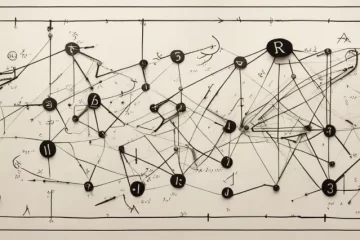Know Yourself Better with ‘12 Rules for Life’ by Jordan Peterson

In an era where self-discovery and personal growth have become buzzwords, it seems nearly impossible to escape the constant reminder to “know yourself.” But what does it truly mean to know oneself? How do we navigate the depths of our own psyche and emerge with a genuine understanding of who we are? Jordan Peterson, renowned clinical psychologist and author of the best-selling book “12 Rules for Life,” offers profound insights into this very journey. In the following article, we delve into Peterson’s teachings and explore how his twelve rules can illuminate the path to self-discovery and navigating the complexities of our own existence. Brace yourself, because this is not your typical self-help guide. It is an intellectual and psychological expedition that challenges conventional wisdom, surpassing mere platitudes to help us unravel the profound depths of our true selves.
What is Know Yourself
Know Yourself” is a phrase that encourages self-awareness and understanding. It suggests the importance of introspection and taking the time to understand one’s own personality, values, strengths, weaknesses, beliefs, emotions, and motivations. Knowing oneself involves being conscious of one’s thoughts, feelings, and behaviors, as well as recognizing how these aspects influence one’s actions and relationships with others. It allows individuals to make informed decisions, set goals, and live a more authentic and fulfilling life. Additionally, knowing oneself can lead to better self-acceptance, self-confidence, and empathy towards others.
Why is Know Yourself Important to Us
Knowing yourself is important for several reasons:
1. Self-awareness: Knowing yourself helps you understand your strengths, weaknesses, values, and beliefs. This self-awareness allows you to make better decisions, set realistic goals, and prioritize what matters most to you.
2. Personal growth: By understanding your thoughts, emotions, and behaviors, you can identify patterns that may be holding you back or preventing personal growth. Knowing yourself can help you break negative habits and develop new positive ones.
3. Improved relationships: Knowing yourself allows you to communicate your needs, preferences, and boundaries effectively. This can lead to healthier and more fulfilling relationships as others understand and respect your individuality.
4. Career success: Understanding your skills, interests, and passions can guide you towards a career path that aligns with your values and brings you fulfillment. Knowing yourself can help you make informed career choices and increase your chances of professional success.
5. Self-confidence: When you know and accept yourself, you gain a sense of self-confidence and self-worth. This self-assurance can empower you to take risks, overcome obstacles, and handle life’s challenges with resilience.
6. Improved mental and emotional well-being: Self-awareness allows you to better manage your emotions, cope with stress, and navigate difficult situations. By understanding your triggers and emotional responses, you can develop healthy coping mechanisms and maintain overall mental and emotional well-being.
Knowing yourself is an ongoing process that requires self-reflection, introspection, and a willingness to explore your thoughts and feelings. It empowers you to lead an authentic and fulfilling life, making it essential for personal growth and success.
Unlocking Know Yourself from 12 Rules for Life

12 Rules for Life Introduction
12 Rules for Life” by Jordan Peterson is a self-help book that provides a set of guiding principles to help individuals find meaning and fulfillment in their lives. It combines psychology, philosophy, and personal anecdotes to offer practical advice on various topics, including personal responsibility, the importance of truth, and pursuing meaningful relationships. The book emphasizes the significance of taking control of one’s life, confronting chaos and suffering, and adopting a balanced approach to living. Each chapter presents a unique rule, such as “Stand up straight with your shoulders back” and “Treat yourself like someone you are responsible for helping,” providing readers with practical wisdom to navigate the complexities of existence and improve their day-to-day lives.
Know Yourself Methods
In the book “12 Rules for Life: An Antidote to Chaos” by Jordan Peterson, the author emphasizes the importance of self-knowledge and offers several methods to help individuals understand themselves better. Here are some of the methods mentioned in the book:
1. Understand Your Faults and Limitations: Peterson suggests taking responsibility for your own flaws and mistakes. By recognizing your limitations, you can work towards self-improvement and personal growth.
2. Honestly Assess Your Life: Reflect upon your decisions, actions, and patterns of behavior. Examine your life and relationships objectively, identifying where you may have made poor choices or contributed to negative situations.
3. Identify Your Values: Peterson encourages readers to determine their core values and live by them consistently. Consider what is truly important to you and align your actions with those values.
4. Seek Truth and Speak It: Engage in honest and open dialogue with yourself and with others. Promote the pursuit of truth and communicate it as transparently as possible.
5. Reflect on Your Own Thinking: Observe your own thoughts and assumptions, becoming aware of any cognitive biases or irrational thinking patterns. This self-reflection can lead to a clearer understanding of yourself and your motivations.
6. Set Meaningful Goals: Establish ambitious but attainable goals for yourself that align with your values. Work towards these goals and view them as essential for personal growth and fulfillment.
7. Embrace Responsibility: Peterson emphasizes the importance of taking responsibility for your life. Recognize that only you have the power to change your circumstances and seek continuous self-improvement.
8. Understand Your Potential for Good and Evil: Reflect upon your capacity for both good and evil actions, reminding yourself of the choices you can make to contribute positively to the world.
Remember, these methods are just a few of the ideas presented in the book. “12 Rules for Life” goes into much more detail on each topic, providing practical advice and guidance on how to apply these methods to your own life.
12 Rules for Life Quotes
12 Rules for Life quotes as follows:
1. “Set your house in perfect order before you criticize the world.”
2. “Compare yourself to who you were yesterday, not to who someone else is today.”
3. “To stand up straight with your shoulders back is to accept the terrible responsibility of life, with eyes wide open.”
4. “Don’t let your children do anything that makes you dislike them.”
5. “Treat yourself like someone you are responsible for helping.”
6. “Pursue what is meaningful, not what is expedient.”
7. “Tell the truth – or, at least, don’t lie.”
8. “Assume that the person you are listening to might know something you don’t.”
9. “Do not bother children when they are skateboarding.”
10. “If you have to choose, be the one who does things, instead of the one who is seen to do things.”

More Books About 12 Rules for Life by Jordan Peterson
1. Personality Isn’t Permanent” by Benjamin Hardy
In this empowering and thought-provoking book, Benjamin Hardy challenges conventional wisdom surrounding the concept of personality. He delves into the idea that our personalities are not fixed, providing practical strategies to help readers transform their lives and become the best version of themselves. This book beautifully complements Jordan Peterson’s “12 Rules for Life” by offering additional insights into personal growth and the potential for change.
2. The Four Agreements” by Don Miguel Ruiz
Don Miguel Ruiz presents four powerful principles for life transformation through Toltec wisdom. These agreements—be impeccable with your word, don’t take anything personally, don’t make assumptions, and always do your best—offer a profound framework for personal freedom and happiness. Aligning with themes of responsibility and truth explored in Jordan Peterson’s book, “The Four Agreements” serves as an excellent companion for readers seeking further guidance on achieving a purposeful life.
3. The Laws of Human Nature” by Robert Greene
In “The Laws of Human Nature,” Robert Greene examines the intricate dynamics of human behavior, exploring the social, emotional, and psychological forces that influence us. By better understanding ourselves and others, readers can navigate their relationships, build emotional intelligence, and make wiser decisions. This book provides valuable insights into the complexities of human nature, complementing the psychological perspectives offered in Jordan Peterson’s work.
4. Atomic Habits” by James Clear
James Clear’s “Atomic Habits” focuses on the power of small, incremental changes that accumulate to transform our lives over time. By implementing practical strategies and principles rooted in behavioral science, readers can learn how to build effective habits, break bad ones, and make progress towards their goals. This book seamlessly complements “12 Rules for Life” by illuminating the importance of discipline and habit formation in one’s journey of personal development.
5. Man’s Search for Meaning” by Viktor E. Frankl
Viktor Frankl’s impactful memoir explores his experiences as a Holocaust survivor, sharing profound reflections on the search for meaning and purpose in life. Drawing from his own suffering, Frankl provides insights that transcend time and adversity. By exploring the depths of human nature and existential questions, this book complements Jordan Peterson’s exploration of one’s individual responsibility and finding meaning in a chaotic world.
By immersing yourself in these five recommended books, you will embark on a transformative journey towards personal growth, self-discovery, and a deeper understanding of the human condition. These works expertly complement the core principles discussed in Jordan Peterson’s “12 Rules for Life,” expanding your perspective and empowering you to navigate life’s challenges with wisdom and resilience.



5 Comments
Mastering Emotion Management: A Must-Read Guide with Think Like A Monk - singleread.com · 12/13/2023 at 14:02
[…] Coping strategies: Knowing and using effective coping strategies to deal with negative emotions or stressful situations, such as seeking support from loved ones, engaging in hobbies or activities […]
Discover the Transformative Power of Psychological Healing in 'The Boy Who Was Raised as a Dog' - singleread.com · 01/04/2024 at 09:52
[…] us establish a sense of inner peace, self-acceptance, and self-love. It allows us to let go of negative emotions and harmful patterns, enabling us to live a more fulfilled and satisfying […]
Level Up Your Game: Harnessing the Force of Positive Thinking in 'The Inner Game of Tennis' - singleread.com · 01/08/2024 at 09:56
[…] motivation, resilience, and overall happiness. It does not mean ignoring problems or denying negative emotions, but rather choosing to approach them with a constructive and hopeful […]
Revolutionize Your Emotion Management Skills with Guy Winch's Emotional First Aid - singleread.com · 01/10/2024 at 00:03
[…] 2. Emotional regulation: The ability to manage and control one’s own emotions, including techniques for calming oneself down or redirecting negative emotions. […]
Harness the Power of Psychological Healing with The Tapping Solution - singleread.com · 01/22/2024 at 00:15
[…] self-love in the healing process. Tapping is used to address and release any limiting beliefs or negative emotions associated with […]